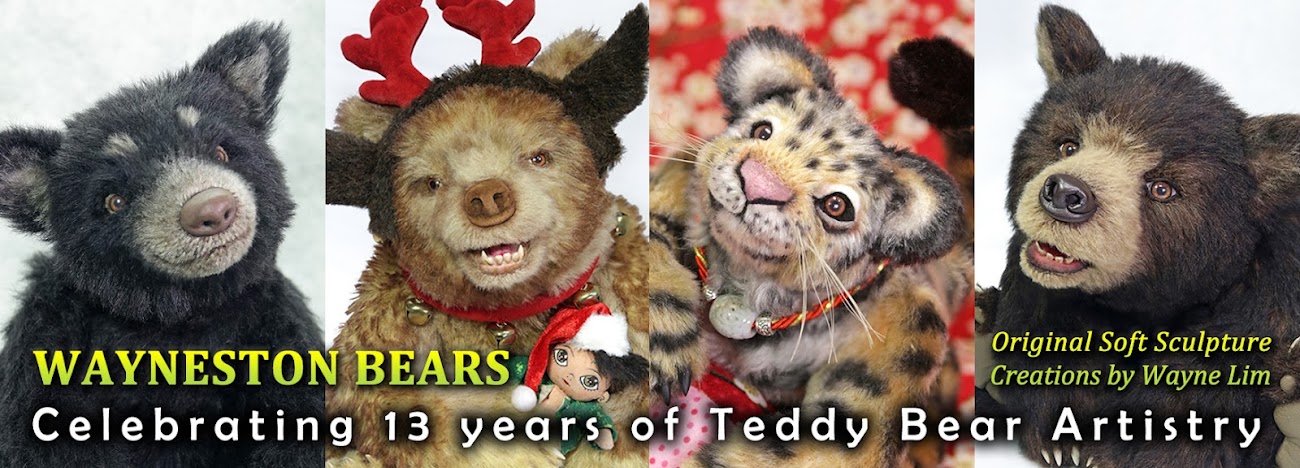I immersed myself
into the art of porcelain doll making a week ago under the guidance from
a doll teacher, Ms Paula Loh. It was a 3 full day workshop to make a 12
inch full porcelain body child doll.
Paula is a Singaporean doll artist certified by the Doll Artisan Guild
(US). I met Paula at an exhibition few months ago and was impressed with
her collection of doll exhibits. I spoke to her about my interest in
doll making and was thrilled that she agreed to teach me. Making a doll
has always been one of my dreams, and it has finally become a reality!
The process of
doll making isn't as simple as it looked. There are numerous tools and
equipments required to make a porcelain doll, and one most important is
the Kiln, for firing.
 |
| Parts of a doll |
The first stage
after casting is called Soft Firing. This is where you need to sand away
the parting mould lines, soaking them in water to trap fine dust while
removing debris. This is also the time when you have to decide if you
want painted or glass eyes for your doll.
Below are some
pictures of eye cutting using a surgical blade. During this process you
have to be extra careful not to cut yourself!.. and make sure that both
eyes are shaped symmetrically.
After sanding, the parts are Bisque fired, requiring temperatures of about 1200 degree Celsius!
After this stage is where we can start China painting.
 |
| Cutting holes for the eyes |
Firstly, I applied
a wash of my preferred skin tone on all the doll parts. This step is
optional but you may choose to do so later, before assembling the
parts. China firing is necessary for the paints to adhere permanently.
China Firing takes about 1.5 hours, and requires a further 1.5 hours for
the kiln to cool down. Every doll requires several rounds of china
firings, hence there are lots of waiting time! So during this period,
Paula taught me how to make a doll's dress. It was my very first time
making a dress! Even tried my hands at using an electric sewing machine
for the first time too! To my relief, it has a speed control dial, so it
wasn't as scary as I thought!
 |
| Seely china paint are used for china painting |
 |
| Parts after washing |
 |
| Kiln for firing doll parts |
 |
| Making a Doll dress |
 |
| Doll dress almost complete |
For my 2nd lesson
after the doll is fired, I applied a 2nd layer of paints around indented
and convex areas, using shadow and blush colours. This is to highlight
and enhance, giving 3 dimensional depth to the doll. Even the tiny nails
are manicured!
 |
| Painting the lips and teeth |
After that, the
parts undergo the 3rd and 4th china firing, where the lash, eyebrows,
eye area, lips and cheek are painted. Some areas are coloured repeatedly
on the final leg of china firing. My doll, whom I've named Emily, has a
sweet smiling face with teeth showing. Therefore I added pearly white
paints for her teeth, which was fired in 3 layers.
Numerous China
firings are done so that the colours are build up in layers, creating
depth and gradient to the doll parts. The number of times you can china
fire is somewhat unlimited. However care must be taken not to overfire,
or the doll will most likely be ruined!
On my last lesson,
Paula showed me how to paint eyelashes and eyebrows. Painting the
lashes and especially the brows are the most difficult part. It is
important to observe the size and shape of both sides to keep them
looking symmetrical. These 2 features strongly determine the expression
of the doll. After the last round of firing was done, it was time to
assemble the doll.
 |
| Painting doll's eye lashes with a fine brush |
The doll is
jointed and strung using elastic bands. The bands are tightened with the
use of forceps. Once tighten and knotted tightly, we gently remove the
forceps and push the loose ends onto the body. We chose a pair of dark
grey eyes to match her Auburn hair and overall look. The glass eyes are
positioned with eye wax.
 |
| Choosing glass eye colours |
 |
| Jointing the doll with elastic bands |
The fun part of
doll making is choosing the paint colours, eyes, wigs, shoes,
accessories and costuming them. There are unlimited styles and colour
combinations to mix and match! You can transform the look of your doll
by simply changing the outfit, wig and eye colour or reposition them to
look sideways. Even changing it from a girl to a boy is easy!
 | |||
| Dolls made by teacher. Using the same doll mold with different hairstyle and painting changes the appearance and help to determine the gender of the doll. |
I
want to thank Paula for her patience and guidance in making my dream
come true. I had an enjoyable time and am looking forward to make
another doll from her soon!
Hugs, Wayne









Well done, Wayne!! She is beautiful!!
ReplyDeleteHugs,
Cheryl
So excited! She is cute :)
ReplyDeletewell done wayne , she is beautiful
ReplyDeleteGreat work, looks amazing.
ReplyDeleteDoll-making is SO interesting! I love your show-and-tell here. Great job on Emily. She's beautiful! I'd love to try my hands on making dolls in the future too. :)
ReplyDeleteSo wonderful! I love how your little one truned out! I have been sculpting dolls and recently wonderifn about making molds and casting them in procelain. So much stuff to buy to try it...
ReplyDeleteThank you Tami, for the compliment! It's really fun trying to make something new. Yes, there are lots of stuff to buy, luckily all materials are provided by the instructor. :)
Delete